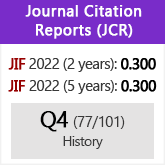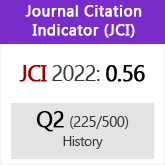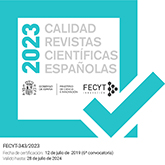Américo Castro’s Conversos and the Question of Subjectivity
DOI:
https://doi.org/10.3989/chdj.2017.018Keywords:
Conversos, Marranism, Subjectivity, Early Modern Spain, Orientalism, Antisemitism, Purity of BloodAbstract
Scholars have long puzzled over the disproportionate role played by Judeo-conversos in the innovative cultural currents of sixteenth- and seventeenth-century Spain. Recently, a number of scholars have developed the idea that outstanding converso thinkers and authors shared a sensibility that anticipated modernity (particularly Jewish modernity). One of the key features of this sensibility was subjective consciousness. This article explores the foundational work of Américo Castro on this subject. Drawing from nineteenth-century orientalist discourse, Castro understood the subjective awareness of conversos to be a renewed expression of ancient “semitic” characteristics discernable in medieval Jewish (and Islamic) writing, as well as in the Hebrew Bible. In Castro’s view, the conversos’ inherent access to their inner life, stimulated by their experience of repression, allowed them to create a literature that became synonymous with Hispanicity. Castro’s conversos, in whom the strongly negative characteristics of his Jews have “disappeared,” are thus harbingers not of modernity, but of a coalescing Spanish national identity. Yet his essentialized view of converso subjectivity has offered support to recent scholarship on “Marranism” and modernity, which follows Castro in its converso-centric apprehension of subjectivity in early modern Europe.
Downloads
References
Amador de los Ríos, José (1848) Estudios históricos, políticos y literarios sobre los judíos de Espa-a, 2 vols. M. Díaz, Madrid.
Amador de los Ríos, José (1875-1876) Historia social, política y religiosa de los judíos de Espa-a, 2 vols. Fortanet, Madrid.
Araya, Guillermo (1969) Evolución del pensamiento histórico de Américo Castro. Taurus, Madrid.
Baer, Yitzhak (1966) A History of the Jews in Christian Spain, 2 vols. Jewish Publication Society, Philadelphia.
Baer, Fritz (1936) Die Juden im christlichen Spanien, 2 vols. Akademie- Verlag, Berlin.
Bataillon, Marcel (1937) Érasme et Espagne: recherches sur l'histoire spirituelle du XVIe siècle. Droz, Geneva.
Bataillon, Marcel (1995) Erasmo y Espa-a: Estudios sobre la historia espiritual del siglo XVI. Fondo de Cultura Económica, Madrid.
Bodian, Miriam (2010) "Review of Yirmiyahu Yovel, The Other Within". The American Historical Review, 115: 616-617. https://doi.org/10.1086/ahr.115.2.616
Boyarin, Jonathan (1994) "The Missing Keyword: Reading Olender's Renan". Qui Parle: Critical Humanities and Social Sciences, 7, 2: 43-56.
Castién Maestro, Juan Ignacio (2006) "Américo Castro ¿una visión orientalista de la realidad histórica de Espa-a?". In Actas de la jornada sobre orientalismo, ayer y hoy (Entrecruce de percepciones), edited by Morales Lezcano, Víctor. Universidad Nacional de Educación a Distancia, Madrid: 49-72. PMCid:PMC2072874
Castro, Américo (1948) Espa-a en su historia: cristianos, moros y judíos. Losada, Buenos Aires.
Castro, Américo (1949) "El enfoque histórico y la no hispanidad de los Visigodos". Nueva revista de filología hispánica, 3: 217-263. https://doi.org/10.24201/nrfh.v3i3.126
Castro, Américo (1954) The Structure of Spanish History. Tr. Edmund L. King. Princeton University, Princeton.
Castro, Américo (1961) De la edad conflictiva. Taurus, Madrid. PMCid:PMC290691
Castro, Américo (1967) "Sobre el no querer entender nuestra historia". Ínsula: Revista Bibliografica de Ciencias y Letras, 22, 247: 1, 12-13.
Castro, Américo (1971) The Spaniards: An Introduction to Their History. Tr. Willard F. King and Selma Margaretten. University of California, Berkeley and Los Angeles. PMCid:PMC376325
Diner, Dan (2007) "Marranische Einschreibungen: Erwagungen zu verborgen Traditionen bei Hannah Arendt". In Babylon 22: Beiträge zur jüdischen Gegenwart. Neue Kritik, Frankfort am Main: 62-71. PMCid:PMC2614104
Ehrenfreund, Jacques and Schreiber, Jean-Phillippe (editors) (2014) Les marranismes: De la religiosité cachée à la société ouverte. Demopolis, Paris. https://doi.org/10.4000/books.demopolis.144 PMCid:PMC4284457
Faur, José (1992) In the Shadow of History: Jews and Conversos at the Dawn of Modernity. SUNY, Binghamton.
Fernández y González, Francisco (1861) Plan de una biblioteca de autores árabes espa-oles o estudios biográficos para server a la historia de la literature arábiga en Espa-a. Manuel Galiano, Madrid.
Ferruta, Paola (2014) "In the Grip of Marranism: The Other within Europe's Multiple Modernities". In The Meanings of Europe: Changes and Exchanges of a Contested Concept, edited by Wiesner, Claudia and Schmidt-Gleim, Meike. Routledge, New York: 47-60.
Fita, Fidel (1889-1898) La Espa-a hebrea, datos historicos, 2 vols. Fontenet, Madrid.
Friedman, Michal (2011) "Jewish History as 'Historia Patria': José Amador de los Ríos and the History of the Jews of Spain." Jewish Social Studies, 18: 88-126. https://doi.org/10.2979/jewisocistud.18.1.88
Friedman, Michal (2012) Recovering Jewish Spain: Politics, Historiography and Institutionalization of the Jewish Past in Spain (1845-1935). Dissertation. Columbia University.
García-Arenal, Mercedes (2013) "Creating Conversos: Genealogy and Identity as Historiographical Problems (after a recent book by Ángel Álcala)". Bulletin of Spanish and Portuguese Historical Studies, 38: 1-19. https://doi.org/10.26431/0739-182X.1087
Gilman, Stephen (1972) Spain of Fernando de Rojas: The Intellectual and Social Landscape of "La Celestina". Princeton University, Princeton. PMCid:PMC198642
Goode, Joshua (2009) Impurity of blood: defining race in Spain, 1870-1930. Louisiana University Press, Baton Rouge.
Gyssels, Kathleen (2012) «Le marranisme absolu dans l'oeuvre d'André et de Simone Schwarz-Bart». Présence francophone, 79: 39-65.
Harst, Joachim (2012) "Making Love: Celestinesque Literature, Philology and 'Marranism'". MLN, 127: 169-189. https://doi.org/10.1353/mln.2012.0062
Jama, Sophie (2007) "L'oeuvre de Montaigne, une contribution du marranisme à l'Occident". In Identités sépharades et modernité, edited by Lasry, Jean-Claude; Lévy, Joseph and Cohen, Yolande. Presses de l'Université Laval, Québec: 157-174.
Juliá, Santos (2004) Historia de las dos Espa-as. Taurus, Madrid.
Junco, José Álvarez (2001) Mater Dolorosa: La idea de Espa-a en el siglo XIX. Taurus, Madrid.
Kriegel, Maurice (1998) "Du marranisme au 'néo-judaïsme': migrations et reconfigurations identitaires dans l'Europe moderne (XV-XVIII siècles)". In Creencias y culturas, edited by Meyuhas- Ginio, Alisa and Carrete Parrondo, Carlos. Universidad Pontificia de Salamanca, Salamanca: 113-128.
Kriegel, Maurice (2002) "Le marranisme: Histoire intelligible et memoire vivante". Annales: Histoire, Sciences Sociales, 57: 323-334. https://doi.org/10.3406/ahess.2002.280048
Lindenberg, Daniel (1997) Figures d'Israël: l'identité juive entre marranisme et sionisme (1648-1998). Hachette, Paris.
Llopesa, Ricardo (1996) "Orientalismo y modernismo". Anales de Literatura Hispanoamericana, 25: 171-179.
Mansfield, Nick (2000) Subjectivity: Theories of the Self from Freud to Haraway. New York University, New York.
Marín Ni-o, Manuela (2009) "Arabismo e historia de Espa-a (1886-1944). Introducción a los epistolarios de Julián Ribera Tarragó y Miguel Asín Palacios". In Los epistolarios de Julián Ribera Tarragó y Miguel Asín Palacios. Introducción, catálogo e índices, edited by Marín, Manuela; De La Puente, Cristina; Rodriguez Mediano, Fernando and Pérez Alcalde, Juan Ignacio. CSIC, Madrid: 11-440.
Marks, Elaine (1996) Marrano as Metaphor: The Jewish Presence in French Writing. Columbia University, New York.
Martin-Márquez, Susan (2014) Disorientations: Spanish Colonialism in Africa and the Performance of Identity. Yale University Press, New Haven. PMCid:PMC4070538
Melamed, Yitzhak (2011) "Review of Yirmiyahu Yovel, The Other Within". The Journal of Modern History, 83: 198-200. https://doi.org/10.1086/658030
Menéndez Pelayo, Marcelino (1891) Discursos leídos ante la Real Academia de Ciencias. Establecimiento tipográfico de R. Fé, Madrid.
Menny, Anna (2010) "Entre reconocimiento y rechazo: los judíos en la obra de Américo Castro." Iberoamericana, 10, 38: 143-150.
Millás Vallicrosa, José M. (1942) Las traducciones orientales en los manuscritos de la Biblioteca Catedral de Toledo. Escuela de la Casa provincial caridad, Madrid.
Millás Vallicrosa, José M. (1948) La poesía sagrada hebraico-espa-ola. CSIC, Madrid.
Millás Vallicrosa, José M. (1956) "Menéndez Pelayo y la literatura hebraicoespa-ola". Sefarad, 16: 249-258.
Monroe, James (1970) Islam and the Arabs in Spanish Scholarship (Sixteenth Century to the Present). Brill, Leiden. PMCid:PMC376912
Netanyahu, Benzion (1979) "Americo Castro and His View of the Origins of the pureza de sangre". Proceedings of the American Academy for Jewish Research, 46: 397-457. https://doi.org/10.2307/3622365
Nirenberg, David (2007) "Race and the Middle Ages" in Greer, M. R., Mignolo, W. D., and Quilligan, M., (editors), Rereading the Black Legend: the discourses of religious and racial difference in the Renaissance empires. University of Chicago Press, Chicago.
Nirenberg, David (2009) "Review of Yirmiyahu Yovel, The Other Within". The London Review of Books, 31:14, 16-17.
Olender, Maurice (1992) The Languages of Paradise: Race, Religion, and Philology in the Ninteenth Century. Tr. Arthur Goldhammer. Harvard University, Cambridge, MA.
Pastore, Stefania (2010) Una herejía espa-ola: Conversos, alumbrados e Inquisición (1449-1559). Tr. Clara Álvarez Alonso. Marcial Pons, Madrid.
Regueiro Salgado, Bego-ia (2013) "Una nueva forma de orientalismo romántico: presencia y valores de lo oriental en la obra de Gustavo Adolfo Bécquer". Bulletin of Spanish Studies, 90: 177-194. https://doi.org/10.1080/14753820.2012.756207
Révah, Israel S. (1967a) Leçon inaugurale faite le jeudi 8 décembre 1966, Colle?ge de France, Chaire de langues et littératures de la péninsule ibérique et de l'Amérique latine. Collège de France, Paris.
Révah, Israel S. (1967b) "Réplica a Don Américo Castro". Ínsula: Revista de letras y ciencias humanas, 22, 253: 5, 14-15.
Révah, Israel S. (2003) Antonio Enríquez Gómez: un écrivain marrane (v. 1600-1663), edited by Wilke, Carsten. Chandeigne, Paris.
Rodríguez Mediano, Fernando (2002) Humanismo y progreso: Pidal, Gómez-Moreno, Asín. Nívola, Madrid.
Rohr, Isabelle (2011) «'Spaniards of the Jewish Type': Philosephardism in the Service of Imperialism in Early Twentieth-Century Spanish Morocco». Journal of Spanish Cultural Studies, 12: 61-75. https://doi.org/10.1080/14636204.2011.556877
Roth, Norman (1989) "Algunos de los primeros hebraístas de Espa-a y sus influencias". Miscelánea de Estudios Árabes y Hebraicos: Sección Hebreo, 37-38: 317-323.
Said, Edward W. (1979) Orientalism. Vintage, New York. Salomon, Herman P. (1975) "The 'De Pinto' Manuscript: A Seventeenth- Century Marrano Family History". Studia Rosenthaliana, 9: 1-62.
Sánchez-Albornoz, Claudio (1943) Espa-a y el Islam. Sudamericana, Buenos Aires.
Shepard, Sanford (1971) "The Background of Uriel da Costa's Heresy – Marranism, Scepticism, Karaism". Judaism, 20: 341-350.
Siegel, Jerrold (2005) The Idea of the Self: Thought and Experience in Western Europe since the Seventeenth Century. Cambridge University, Cambridge. https://doi.org/10.1017/CBO9780511818141
Simms, Norman (2005) Masks in the mirror: Marranism in Jewish experience. Peter Lang, New York.
Szpiech, Ryan (2014) "Américo Castro, Erich Auerbach, y la 'ciencia' historiográfica". In Encrucijada de culturas: Alfonso X y su tiempo, Homenaje a Francisco Márquez Villanueva, edited by González Ferrín, Emilio. Fundación Tres Culturas, Seville: 101-124.
Trigano, Shmuel (2000) "Le marranisme, un modèle multidimensionnel". Pardès, 29: 261-269.
Trigano, Shmuel (2012) «'Etrangers et résidents': Ce qui, dans le judaïsme, rend possible le marranisme». In La Civilisation du judaïsme: De l'exil a la diaspora, edited by Trigano, Shmuel. Eclat, Paris: 295-303. https://doi.org/10.3917/ecla.triga.2012.01.0295
Yovel, Yirmiyahu (2009) The Other Within: The Marranos: Split Identity and Emerging Modernity. Princeton University, Princeton.
Wachtel, Nathan (2007) "Théologies marranes: Une configuration millénariste". Annales. Histoire, Sciences Sociales, 62: 69-100.
Wachtel, Nathan (2013) The Faith of Remembrance: Marrano Labyrinths. Tr. Nikki Halpern. University of Pennsylvania, Philadelphia.
Zahavi, Dan (2008) Subjectivity and Selfhood: Investigating the First Person Perspective. MIT, Cambridge, MA.
Zepp, Suzanne (2014) An Early Self: Jewish Belonging in Romance Literature, 1499-1627. Tr. Insa Kummer. Stanford University, Stanford. https://doi.org/10.11126/stanford/9780804787451.001.0001
Published
How to Cite
Issue
Section
License
Copyright (c) 2017 Consejo Superior de Investigaciones Científicas (CSIC)

This work is licensed under a Creative Commons Attribution 4.0 International License.
© CSIC. Manuscripts published in both the printed and online versions of this Journal are the property of Consejo Superior de Investigaciones Científicas, and quoting this source is a requirement for any partial or full reproduction.All contents of this electronic edition, except where otherwise noted, are distributed under a “Creative Commons Attribution 4.0 International” (CC BY 4.0) License. You may read here the basic information and the legal text of the license. The indication of the CC BY 4.0 License must be expressly stated in this way when necessary.
Self-archiving in repositories, personal webpages or similar, of any version other than the published by the Editor, is not allowed.

















